Foreign News
Canada’s Carney makes statement by choosing Europe, not US, for first foreign trip
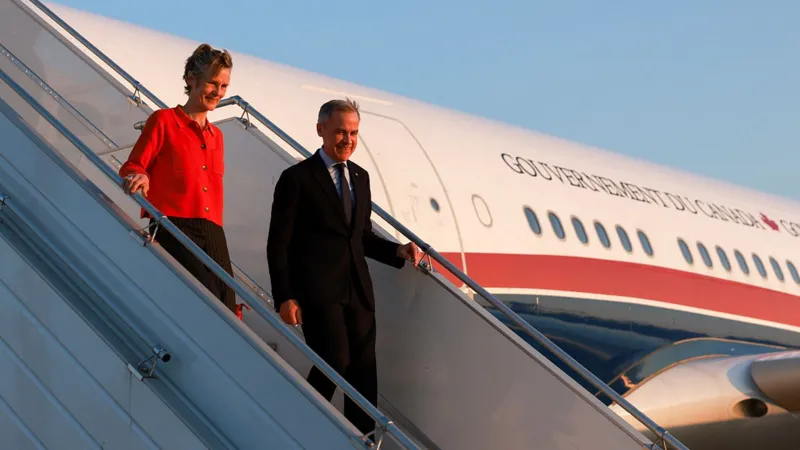
Two European politicians, dressed symbolically in red and white, sent a message last week to Canada on social media declaring “we’ve got your back”.
Also signalling support was King Charles, who planted a red maple tree on the grounds of Buckingham Palace and wore his Canadian medals during a high-profile visit to a naval warship.
Canada’s new Prime Minister Mark Carney has arrived in Paris before heading to London on Monday – a day after his 60th birthday – for his first foreign visit hoping to achieve more than symbolic encouragement. He wants solid support from allies.
Not only is Canada being targeted, like Europe, by a raft of swingeing US tariffs, but Donald Trump is making it clear he wants to take over his northern neighbour.
“We appreciate all the symbolic gestures but we need more public backing,” a Canadian official told me in a voice which underlined the nervous disbelief shared by most Canadians – Trump is not joking when he calls Canada the United States’s “51st state”.
The official messaging from Ottawa about Carney’s trip underlines his priorities – finance and fortifying security – a natural fit for the economist who headed the central banks in both Canada and the UK. A statement from his office said his visit is meant “to strengthen two of our closest and longest-standing economic and security partnerships”.
His itinerary is full of great symbolism too.
Carney revealed it on Friday during his first speech as prime minister when he hearkened back – with a shiny polish – to the origins of this former colony. He hailed “the wonder of a country built on the bedrock of three peoples: indigenous, French and British”.
So there’s a third destination on this whistle-stop tour – Iqaluit, the capital of Canada’s northernmost territory of Nunavut and homeland of its Inuit people. That stop, the statement emphasised, was to “reaffirm Canada’s Arctic security and sovereignty”.
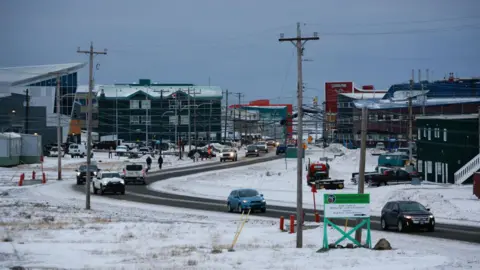
Spectacular Arctic and northern terrain makes up 40% of the land mass of the world’s second largest country. Protecting it is a critical Canadian concern in the midst of intensifying rivalry among world powers in the Arctic region, which has drawn in the US, Russia, China and more; it’s the cold war of all cold wars.
And there’s a personal twist. Carney was born in the small town of Fort Smith in the Northwest Territories, which lies next to Nunavut.
His schedule underlines that he also needs to be a quick study in a new skill – retail politics. A federal election, which has to be held by October, is expected to be called very soon. Carney needs to prove that he can engage with voters, in English and French, as naturally as he does with bankers and finance bosses.
And he needs a proper political mandate. He secured a whopping 86% of the vote when his Liberal Party chose to replace Justin Trudeau, who stepped down as [rime minister amid growing calls to resign from his own party after a decade at the top.
But Carney doesn’t have a seat in parliament; he still doesn’t have the vote of Canadians.
His Liberal party has just experienced a dramatic reversal, a “Trump bump” as well as a Trudeau one. The party which seemed certain to lose, and lose badly, is now tied with its main Conservative rivals in the polls.
Looking like a world leader, and understanding the world of tariffs and trade, is a good look when you are running for high office in the dark shadow of an external threat.
“I think part of the purpose of Mark Carney’s trip to Europe is to show that he can talk internationally to other like-minded powers at this very important moment,” reflects the eminent Canadian historian Margaret MacMillan.
Back home, voters will decide if that is what counts.
Carney is certain to talk Trump tactics, in private, with France’s President Emmanuel Macron and Britain’s Prime Minister Sir Keir Starmer. They’ve both taken great pains to flatter the US president in public, and press their case behind closed doors.
Many will be watching to see how Trump addresses Mark Carney – he recently referred to Canada’s former prime minister as “Governor Trudeau”.
Canada’s new top talker has been talking tough.
A week ago, when Carney won his party’s leadership contest, he invoked Canada’s national sport, ice hockey, which has long been locked in rivalry with US teams. “Canadians are always ready when someone else drops the gloves,” Carney declared to rousing applause.
“Make no mistake, Canada will win.”
But everyone knows this is no game. Carney described this escalating trade war as “the greatest crisis of our lifetime”. More than 80% of Canada’s exports cross the border to the US.
And while there have been a few reports of Canadians flying the US flag, a recent poll by the Angus Reid Institute underlined that a thumping 91% of Canadians reject becoming the 51st state.
On Friday, in Ottawa’s icy cold weather, Carney struck a warmer tone, highlighting how he and Trump share a background in business, including real estate.
“The president is a successful businessperson and dealmaker. We are his largest client in so many industries,” he remarked. “Clients expect respect and working together in a proper commercial way.”
Carney says he “looks forward” to speaking with President Trump. But the fact it will be a call, not a visit, is a measure of this moment. Traditionally, the first foreign visit of a Canadian leader is to the US – its closest neighbour and most trusted partner.
[BBC]
Foreign News
US to host Qatari, Turkish and Egyptian officials for Gaza ceasefire talks
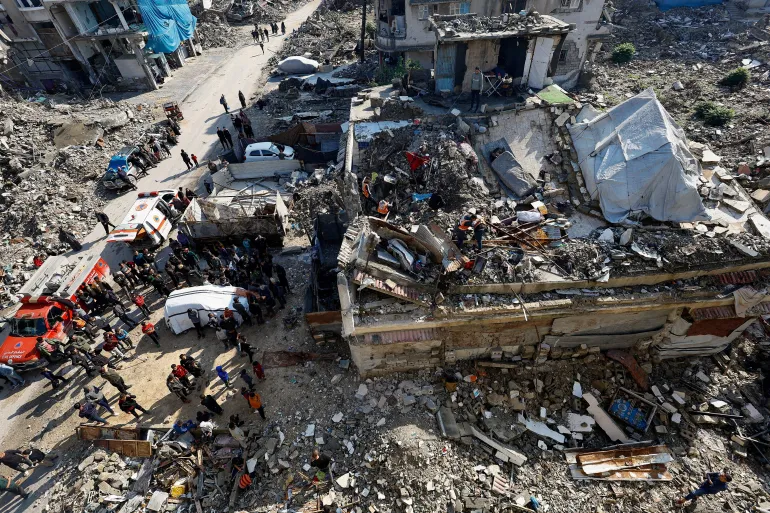
The United States Middle East envoy, Steve Witkoff, will hold talks in Miami, Florida, with senior officials from Qatar, Egypt and Turkiye as efforts continue to advance the next phase of the Gaza ceasefire, even as Israel repeatedly violates the truce on the ground.
A White House official told Al Jazeera Arabic on Friday that Witkoff is set to meet representatives from the three countries to discuss the future of the agreement aimed at halting Israel’s genocidal war on Gaza.
Axios separately reported that the meeting, scheduled for today [Friday], will include Qatari Prime Minister and Foreign Minister Sheikh Mohammed bin Abdulrahman bin Jassim Al Thani, Turkish Foreign Minister Hakan Fidan and Egyptian Foreign Minister Badr Abdelatty.
At the same time, Israel’s public broadcaster, quoting an Israeli official, said Prime Minister Benjamin Netanyahu is holding a restricted security consultation to examine the second phase of the ceasefire and potential scenarios.
That official warned that Israel could launch a new military campaign to disarm Hamas if US President Donald Trump were to disengage from the Gaza process, while acknowledging that such a move was unlikely because Trump wants to preserve calm in the enclave.

Despite Washington’s insistence that the ceasefire remains intact, Israeli attacks have continued almost uninterrupted, as it continues to renege on the terms of the first phase and blocks the free flow of desperately needed humanitarian aid into the besieged Palestinian territory.
[Aljazeera]
Foreign News
Ex-Nascar driver and his family among seven killed in US plane crash

A former Nascar driver and his family were among the seven people killed in a plane crash at a regional airport in North Carolina, the car-racing organisation has said.
A highway patrol spokesman said people on the ground confirmed that Greg Biffle was among those who boarded the plane.
The Cessna C550 crashed while landing at Statesville Regional Airport around 10:20 local time (15:20GMT), officials investigating the incident told reporters.
“Greg was more than a champion driver, he was a beloved member of the NASCAR community, a fierce competitor, and a friend to so many,” Nascar said in a statement where it confirmed Biffle had died along with his wife, daughter, son, and three others.
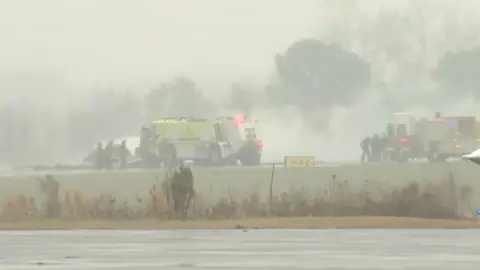
“His passion for racing, his integrity, and his commitment to fans and fellow competitors alike made a lasting impact on the sport,” the company added.
Beyond the racetrack, Biffle was remembered for helping in North Carolina in the aftermath of last year’s Hurricane Helene, when he used his personal helicopter to rescue stranded residents and deliver supplies.
Tributes to the former racer poured in on Thursday.
“Heartbreaking news out of Statesville,” North Carolina Governor Josh Stein posted on X. “Beyond his success as a NASCAR driver, Greg Biffle lived a life of courage and compassion and stepped up for western North Carolina after Hurricane Helene.”
Motorsport YouTuber Garrett Mitchell wrote on Facebook that Biffle and his family were on their way to spend the afternoon with him.
“Unfortunately, I can confirm Greg Biffle, his wife Cristina, daughter Emma, and son Ryder were on that plane… because they were on their way to spend the afternoon with us,” he wrote on Facebook. “We are devastated. I’m so sorry to share this.”
Statesville Airport Director John Ferguson described the aircraft as a corporate jet and said it was already engulfed in flames when he arrived on the scene.
The Cessna C550 aircraft is owned by a private company associated with Biffle, CBS, the BBC’s US partner, reported.
The jet took off around 10:06 local time and was in the air briefly before it crashed on the east end of the runway.
Authorities are investigating the cause of the crash.
Statesville Airport will remain closed until further notice as crews clear debris off the runway, Mr Ferguson told reporters.
Officials did not provide any information about deaths or people aboard the aircraft during their first media conference.
The National Transportation Safety Board, which is leading the investigation has sent in a team to investigate the fatal crash.
The Statesville Regional Airport (KSVH) is owned by the City of Statesville, which is about 45 minutes north of Charlotte.
It also provides aviation facilities for Fortune 500 companies and several Nascar racing teams.
[BBC]
Foreign News
UK and South Korea strike trade deal

The UK and South Korea have finalised a trade deal which the government says will create thousands of jobs and bring billions into the British economy.
British industries including pharmaceuticals, car manufacturing, alcohol and financial services are expected to benefit from an extension to the current tariff-free trade on most goods and services.
The deal is the fourth such agreement struck by the Labour government, following deals with the EU, US and India — none of which have had a material impact on the UK’s economy so far.
South Korean culture, including music, cosmetics and food, has become much more popular in the UK in recent years.
(BBC)
-

 Midweek Review4 days ago
Midweek Review4 days agoHow massive Akuregoda defence complex was built with proceeds from sale of Galle Face land to Shangri-La
-

 Features7 days ago
Features7 days agoWhy Sri Lanka Still Has No Doppler Radar – and Who Should Be Held Accountable
-

 News3 days ago
News3 days agoPakistan hands over 200 tonnes of humanitarian aid to Lanka
-

 News3 days ago
News3 days agoPope fires broadside: ‘The Holy See won’t be a silent bystander to the grave disparities, injustices, and fundamental human rights violations’
-

 Latest News6 days ago
Latest News6 days agoLandslide early warnings in force in the Districts of Badulla, Kandy, Kegalle, Kurunegala, Matale, Nuwara Eliya and Ratnapura
-

 News4 days ago
News4 days agoBurnt elephant dies after delayed rescue; activists demand arrests
-
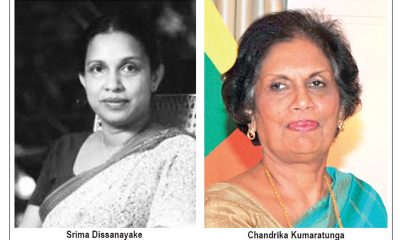
 Features7 days ago
Features7 days agoSrima Dissanayake runs for president and I get sidelined in the UNP
-

 Editorial7 days ago
Editorial7 days agoDisaster relief and shocking allegations












